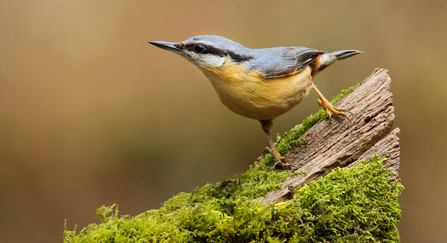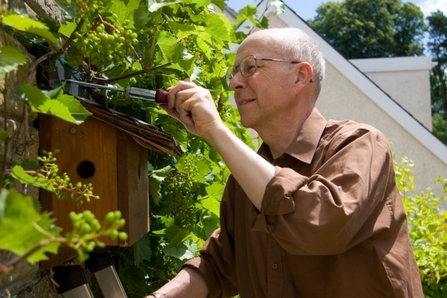
false - Jon Hawkins – Surrey Hills Photography

false - Jon Hawkins – Surrey Hills Photography
Choosing a nest box:
Nest boxes, or bird boxes, can be either accessed by a small round hole or they can be open-fronted.
Blue tits, great tits and house sparrows tend to prefer nest boxes which are accessible through a hole. However, the size of hole will suit some species better than others. Nest boxes with a hole of 25mm or 28mm diameter are suitable for coal tits and blue tits while a larger diameter of 32mm would better suit house sparrows, great tits and nuthatches (above). Open-front nest boxes are favoured by birds such as robins, wrens, blackbirds and wagtails.
If you have a nest box with an entrance hole, rather than an open-front nest box, a metal protective plate can prevent predation from squirrels and magpies.
Nest boxes can be relatively easy – and rewarding – to build. Follow our step-by-step guide at https://www.durhamwt.com/actions/how-build-bird-box to create your own nest box. Alternatively, Durham Wildlife Trust sells a range of nest boxes which can be viewed at visitor centres, Rainton Meadows and Low Barns or ordered online at Bird Boxes & Animal Homes (durhamwt.com).
Choosing where to install your nest box:
When installing a nest box in your garden, there are a few important factors to consider. Firstly, consider hanging your nesting box in a location which is protected from wind, sunlight and rainfall. The best position to hang a nest box is facing between north and south-east to avoid strong direct sunlight and the heaviest rain.
If your nest box is open-fronted, it may be better to hang these in an area which is somewhat sheltered by foliage or shrubbery. Nearby shrubs or hedges can offer support to fledglings when they take their first flight. Vegetation can also help to hide your nest box from observing neighbourhood cats.
Finally, once you have found the perfect position for your nest box, and are ready to install it, tilt the box forward slightly to deflect rain from the entrance.

Bird Box Installation (c) Dave Kilbey
Nest Box Maintenance
Nest boxes can harbour disease and moisture when not in use. At the end of the nesting season, once birds have fledged, it is important to clean our nest boxes and remove any nesting material. This can be done with scalding water, without the use of any chemicals. If the box isn't cleaned it is unlikely to be used again - yearly maintenance is a necessity.
Sponsor a Durham Wildlife Trust nest box
Low Barns Nature Reserve is considered one of the North East's most important wildlife sites. The woodlands and grasslands here are home to a variety of bird life throughout the year, from spectacular displays by flocks of roosting starlings to snipe, flycatchers and tawny owls.
Nest box sponsorship is a great way to support this wonderful reserve and its many feathered inhabitants. Your donation will fund the installation and upkeep of our reserve boxes, as well as contribute to bird feed for our feeding stations at Low Barns.
Each box sponsor will receive:
Learn more at Nest Box Sponsorship Monthly (durhamwt.com).
Durham Wildlife Trust Membership
The very best and most direct way to support wildlife where you live is to support your local Wildlife Trust. Durham Wildlife Trust works to protect, enhance and promote wildlife and nature conservation in South Tyneside, Sunderland, Darlington, Gateshead and County Durham.
As a member, your donation helps to continue vital conservation work in your local area. You will also receive a wildlife magazine three times a year, packed full of tips, ideas, walks and updates on everything that's going on near you. We'll also send you a Wild About Gardens guidebook, a car sticker and a Durham Wildlife Trust badge!